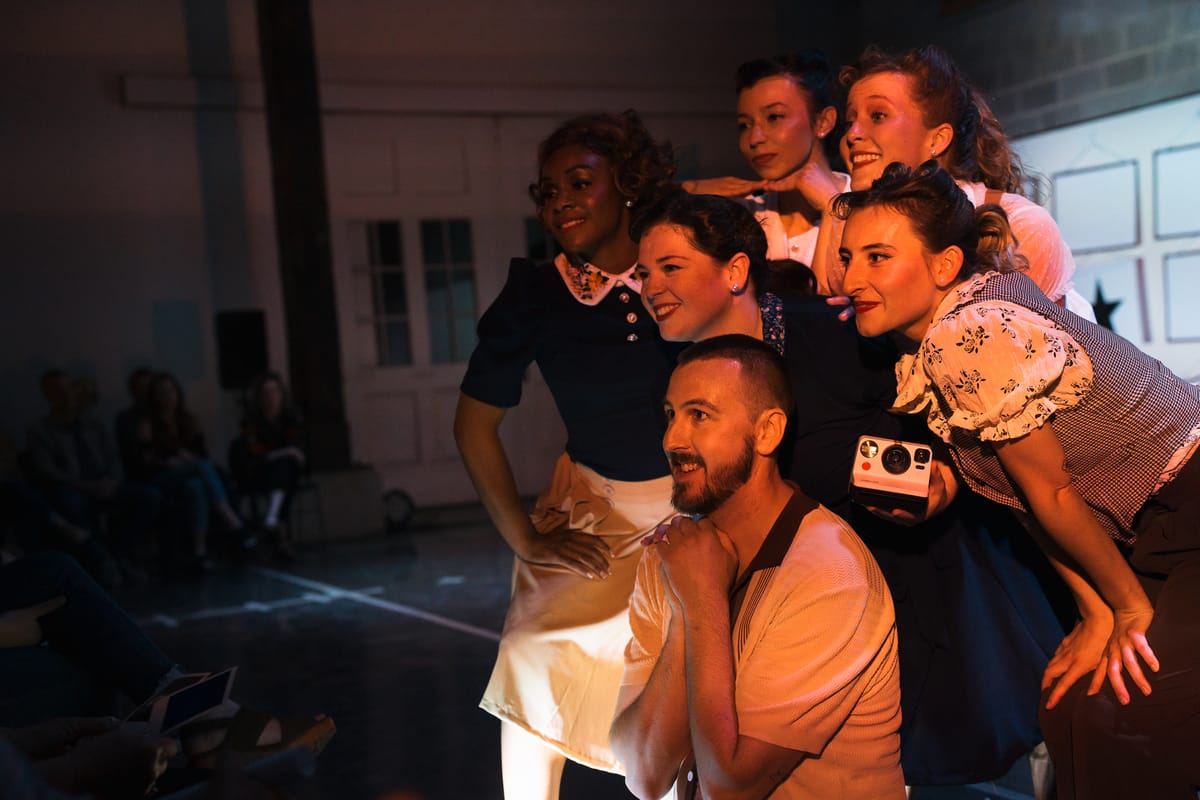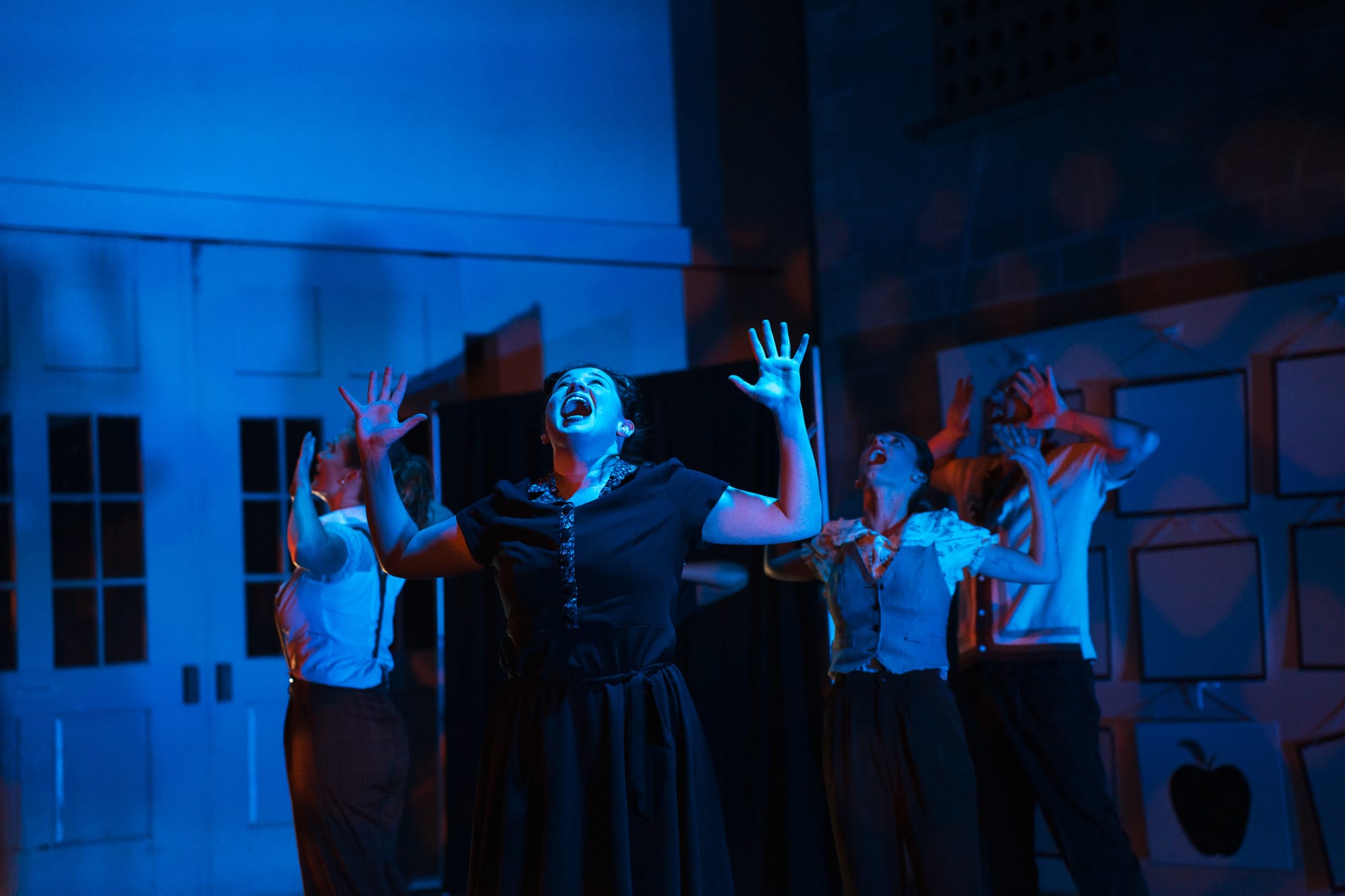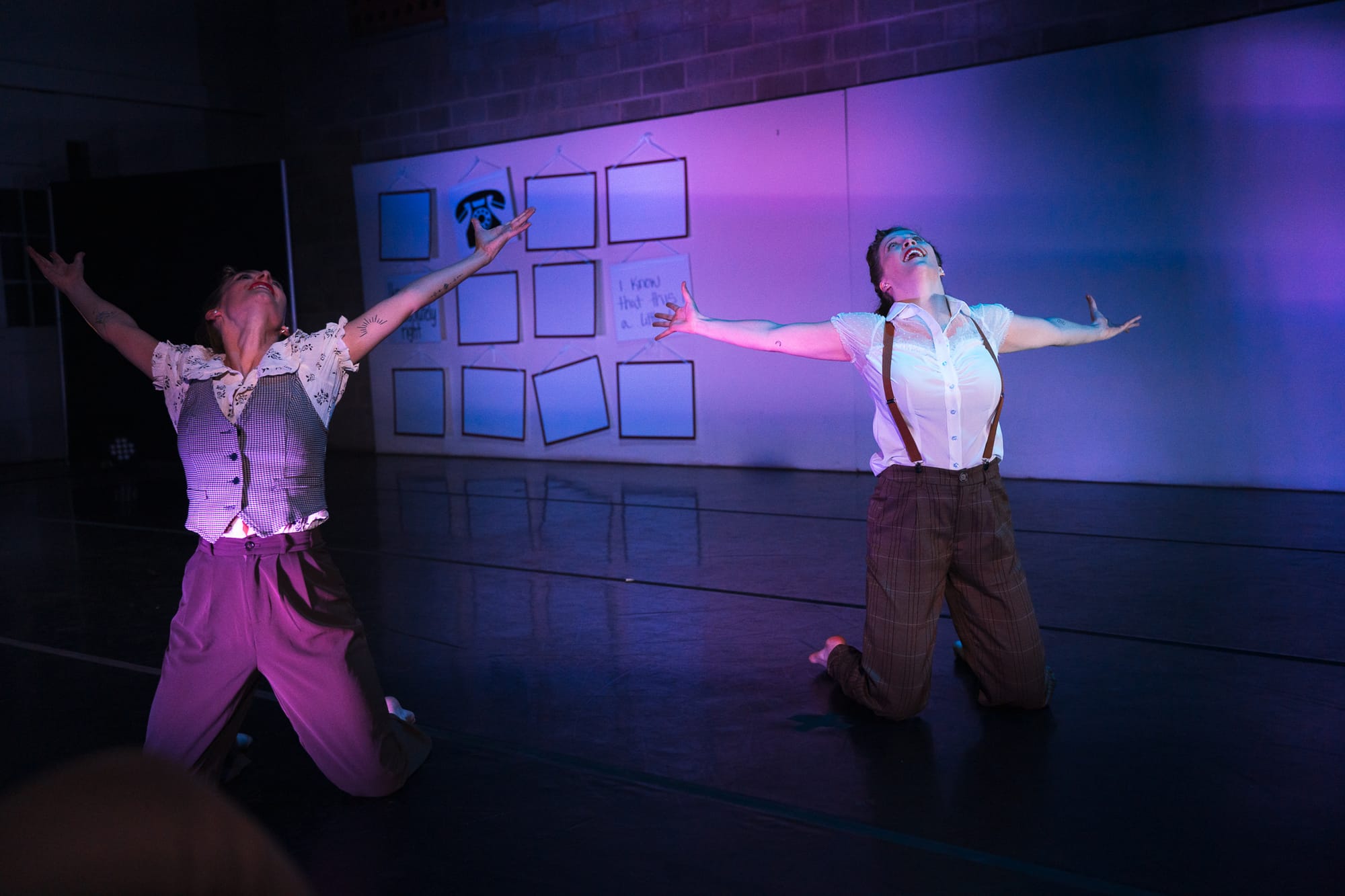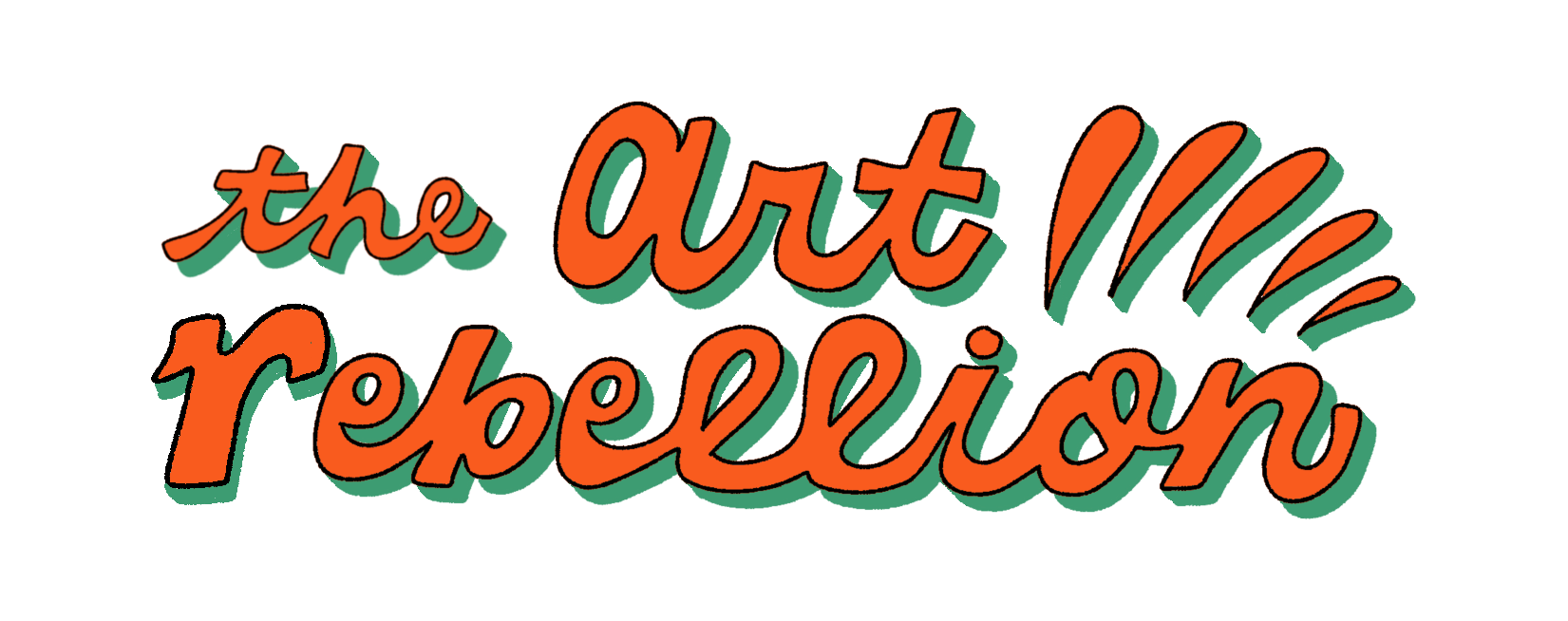A Chicago dance company dedicated to community and collaboration
I talk to choreographer Stefany Cotton about the evolution of the Rooted Space and the needs of dance artists in the city.

As an arts journalist, I’ve interviewed many choreographers over the years. But this story is a first: a conversation with the choreographer of a show I’m performing in.
Over the past two months, I’ve been rehearsing with the Rooted Space in Chicago for “Let the Record Show,” an evening-length work choreographed by Stefany Cotton. The show on April 6 is also serving as a fundraiser for the dance company, which is now in its second season.
In 2020, Stefany and co-founder and co-artistic director, Chelsea Branch, opened the Rooted Space to bridge gaps in the Chicago arts community and offer affordable dance space and classes.
Stefany and Chelsea launched the company with an audition in late 2022 as an outlet for creation and to support dancers by giving them jobs. The company’s debut performance was “Let the Record Show” last May, which the company learned over a 6 month process.
“Let the Record Show” explores memories, how they fade and change over time. It was inspired by an experience Stefany had recounting a story from her childhood, a memory that turned out to be not quite true. The show is music-driven, using songs ranging from the 1940s through 2000s to inspire the movement and characters.
I’m performing in a re-staging of the work with three of the original dancers and three new artists. We’ve been working at what sometimes feels like a break-neck speed to learn choreography and get performance ready. But the process has been energizing and just a lot of fun. (There's one piece in the show where we obnoxiously chew bubble gum while dancing.)
After one Friday rehearsal, Stefany and I stayed behind to talk about the evolution of the Rooted Space, the realities of running a small dance company in Chicago, and the needs of dance artists in the city.

Interview edited lightly for length and clarity
How does it feel to re-stage the show with a new cast in only two months?
It is surprising to me, speaking of memory, how much of it I forgot. And amazing to me how much our original cast members remember. I am the kind of person that when I choreograph something, as soon as I teach it, and it is out of my body and into the dancers body, it's also out of my brain. I need to clear that space so I can keep creating more. For the three dancers that were in the original that have come back, a lot of it was still in their body, which I think is really interesting — the muscle memory.
Speaking of memory, I do think with our three new members, I'm asking a lot. I'm asking you, them to learn an entire show in 8 to 10 weeks, and also fully immerse yourself in the character, fully immerse yourself in the story, the storytelling, the time period, the different character from piece to piece, chewing gum, playing telephone. There are so many things that are happening on top of learning 45 minutes of choreography. I'm really pleased and blown away with how smooth the process is going for how short of a time that we have.
That's good to hear because the process for me, learning so much choreography, has felt tough at times.
I can only imagine how insane it must feel for all of you, because even now as we re-learned it, I still couldn't perform it. Because as soon as we learned it, I'm done and moving to the next one. Also the show feels like my baby, and so the care that all six of you take and put into this show is really lovely. It's such a fast, chaotic process and you're learning from me, but you're also learning from the old dancers. And it's the fact that it's so cohesive already, and that you're all already willing to go the extra mile to become the character is just really, really exciting.
Could you speak more about the evolution of the Rooted Space?
Chelsea and I first started with what we called “Art Conversations,” and we just tried to reach as many artists as we could and get together once a month to discuss what the Chicago dance community is missing or lacking. Part of the discussion was we need space, we need affordable space. We need affordable classes. Through the wildness of the pandemic where a lot of studios closed and things shifted, this studio became available. We were like, well this is right now what we can give to the community and bring to the dance community.
When we opened the studio at first, I felt really fulfilled with taking our classes and managing the studio and didn't really feel the need or the itch to want to create anything at the time. As we got more into our groove of the day-to-day at the studio, I got that itch again and wanted to find a way that my choreography could be a part of the studio.
We created the Rooted Space company and we've come to learn that our priority from the beginning and now our mission is to support the individual artists that are a part of the company and a part of this community. And how can we support this community of people coming to take class and renting space? How can we support them even further is to give them jobs. How can we give them jobs is through this dance company. Now we're at the stage of trying to get more money to give more jobs and to pay a more reasonable rate.

How is the Rooted Space and the company funded?
The space is now sustaining itself. Originally, Chelsea and I invested in the supplies and the startup and all of those things, but we're happy to announce that we're at a point where that studio is sustaining itself. We're thinking of the company as a completely separate entity from the studio. The company is fiscally sponsored by not-for-profit, the Space Movement Project. We are raising money for the company, for not only this season, but to continue the longevity of the company, because while the studio can support itself, it cannot support the company.
We are focusing this season on fundraising, on cultivating relationships with people who want to continue to donate to us, trying to get into the grant seeking world and finding funds outside of the studio, so that this company can also sustain itself. And we can hopefully pay our dancers more from year to year to year, until we get to a livable wage for the company dancers. And maybe one day for the artistic directors.
Note: as a dancer with the Rooted Space, we are paid $10 per rehearsal, between $30-$75 for performances, and are offered free classes. Read more about Chicago dancer pay in Darvin Dances' Pay Transparency Project.
I was going to ask if you have a salary?
For the studio? Yes. For the company? No. The additional time that Chelsea and I put in when the company is in session, it's all very separate. We are paying our outside choreographers, we are not paying Chelsea and I for this show, our fall show, our past show. Because for us right now, we're trying to be realistic of how much money we can raise, and we want that money to go to the artists, to the dancers, to the outside choreographers, because we value the artists more than we want to get paid.
It's our second season, but it's our first season trying to fundraise. We may not hit all of our fundraising goals. Everything that we make will go towards the dancers, towards the choreographers, and we'll deal with us later.
What kind of support would you like to see from the city of Chicago or maybe even nationally to support artists, and this company, and the space itself?
I would love to see more grants and opportunities given to smaller companies. The larger companies in this city are wonderful and absolutely deserving of the money, and the grants, and the recognition. I also think that's true for the smaller companies who are probably not getting the recognition, the money, and the grants. I wish that there was more accessible opportunities.
Grants are really difficult to submit and it feels like the language is always trying to trick you, or really difficult, or asking for a lot of things, or something that you know is revolutionary that you're doing. Sometimes the act of making art is revolutionary in and of itself. There are a lot of us that are doing it. And I think we're all deserving. How then do you decide who gets it? I don't know that answer. But if I could wave a magic wand, it would be that grants were more accessible, easier to submit to, and that there was just room for everybody. I think in this world, in this country, there is money for all of us. But how do we get it to everybody? I don't know that answer.
Do you have any advice for people who might be interested in starting their own company or producing their own show?
Just do it. When I started, I had this mindset of, I really love choreographing. I had a realization of, people aren't paying me to choreograph right now so I'm going to make my own opportunities, and I just did it. Especially at a time now where we're all trying our best to pay our dancers for their time. And that is also the biggest hurdle, because where do you get that money? If that's something that's stopping you, find some dance friends that would be interested in working with you and collaborating with you, or just showing up for you for free for the time being and just start working and start creating — even if it's a studio showing, even if it's an outdoor in the park, under a tree performance, or “I've got a really big backyard,” like whatever it is, just do it.
As you do it, you're gonna learn so much. Don't be afraid to ask for help. You can always ask the Rooted Space for help. We'll share our knowledge, we share what we know. I spent a lot of time feeling discouraged and feeling frustrated because I wasn't getting the opportunities that I wanted. And so I just decided one day, I'm going to make my own opportunities. And if it weren't for that choice in 2017, I don't know if the Rooted Space would be here, or be what it is today.
There was a funny moment recently where we talked about being in our 30s. I’ve been wondering lately, have I aged out of dance? I'm curious, what are your thoughts about being in your 30s and still dancing or choreographing?
It's a funny question because when I am at the studio, I tend to be one of the oldest ones here. We get a lot of dancers fresh out of college who come and take class with us, and it's wonderful, and I'm grateful for that. But they're a decade younger than me at this point — some more than that. When I'm here sometimes, I feel old because I know I'm the oldest one in the room typically.
I don't necessarily feel like, “oh, I can't be here because I'm old,” but I do typically recognize, I'm the oldest one in class tonight. Outside of the studio, most of my friends are older than me. And some of them years older than me. They were a part of dance companies that no longer existed when I came to Chicago. I feel really lucky because this idea of aging out of dance has not yet hit me — it hit my body, my body is tired. My body knows that it's been a long time, my body knows we haven't been taking care of it for all of its 32 years.
But I'm so often I'm around dancers that are older than me, that are dancing more than me. And so I don't feel that yet. Now I'm rehearsing to perform in a show at the end of April by Kimberly Baker, and she's already planning another show that she's invited us to be in. So for me it feels like this is just starting all over again for me, this performance era.
I feel really lucky that I have this group of more mature dancers that prove to me that I'm nowhere near aging out, because they're nowhere near aging out.

What's your vision for the Rooted Space, if money were no issue and you had unlimited funds?
If we had unlimited funds, let me tell you, we would have multiple studios. We would have a performance space. We would have an event space so that you could rehearse with us. You could perform with us. You could host a fundraiser with us. It would all be affordable.
If we didn't even need to make money like yes, everybody come for free.
The company would perform more often. I would love to tour with the company. I would love to keep creating new works with the company and maybe I get paid for creating work for the company. The dream is a bigger space, more space, performance space. It's so tough to find available, affordable, dance friendly performance space in this city. Especially for somebody like me, who doesn't always love a traditional proscenium type stage. And then just make it available to everybody and everyone all the time so we can just do what we love and not worry about paying our bills.
Support the Rooted Space
Let the Record Show, an evening-length performance and fundraiser
When: Saturday, April 6 at 7:30pm.
Where: 1803 W Byron St. Chicago
Tickets: Start at $35
Who: Dancers are Mia Barnett, Ella Dorman, Noa Greenfeld, Ashley Johnson, Sawyer McNamara, and me 😊
You can also donate to the company here.
